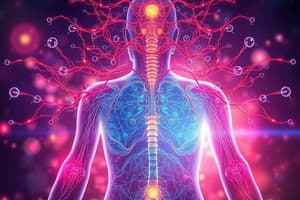Podcast
Questions and Answers
Which of the following is NOT an activity regulated by the neuroendocrine system?
Which of the following is NOT an activity regulated by the neuroendocrine system?
- Growth
- Sleep patterns (correct)
- Reproduction
- Glucose homeostasis
Growth hormone is produced by the hypothalamus.
Growth hormone is produced by the hypothalamus.
False (B)
What is the primary function of growth hormone?
What is the primary function of growth hormone?
Regulation of growth and metabolism
The hypothalamus releases releasing factors that act on the __________.
The hypothalamus releases releasing factors that act on the __________.
Match the following hormones with their respective properties:
Match the following hormones with their respective properties:
What is one major difference between drugs and hormones?
What is one major difference between drugs and hormones?
The effects of drugs and hormones can last for days at a time.
The effects of drugs and hormones can last for days at a time.
Name one gland that receives stimulation from tropic hormones.
Name one gland that receives stimulation from tropic hormones.
What is the primary function of insulin-like growth factor 1 (IGF-1)?
What is the primary function of insulin-like growth factor 1 (IGF-1)?
Chronic excess of growth hormone in adults causes increased height.
Chronic excess of growth hormone in adults causes increased height.
What synthetic hormone is used to treat dwarfism caused by growth hormone deficiency?
What synthetic hormone is used to treat dwarfism caused by growth hormone deficiency?
Corticosteroids are produced by the ______ cortex.
Corticosteroids are produced by the ______ cortex.
Match the following conditions with their causes:
Match the following conditions with their causes:
Which medication can reduce growth hormone release by acting at somatostatin receptors?
Which medication can reduce growth hormone release by acting at somatostatin receptors?
Corticosteroids influence carbohydrate, protein, and fat metabolism.
Corticosteroids influence carbohydrate, protein, and fat metabolism.
Name the two important types of corticosteroids.
Name the two important types of corticosteroids.
Flashcards are hidden until you start studying
Study Notes
Neuroendocrine System
- The neuroendocrine system is a network of glands that release hormones to regulate a variety of body functions, including growth, reproduction, stress response, metabolism, and immune function.
- The hypothalamus, located in the brain, releases releasing factors that stimulate the anterior pituitary gland to produce tropic hormones, which in turn stimulate other endocrine glands to release effector hormones.
Growth Hormone
- GH is a 191-amino acid peptide hormone produced by the pituitary gland, its production is stimulated by GHRH and inhibited by somatostatin.
- GH levels are highest in early life, promoting growth by stimulating the production of IGF-1, which acts on skeletal muscle, bone, and cartilage to stimulate protein production and growth.
- Growth hormone deficiency in childhood leads to dwarfism, characterized by short stature.
- Excess growth hormone in children leads to gigantism, while in adults it leads to acromegaly.
- Somatropin, a synthetic version of growth hormone, can be used to treat growth hormone deficiency.
Growth Hormone Management
- Excessive growth hormone can be managed with surgery, radiotherapy, somatostatin analogues like pasireotide, or growth hormone receptor antagonists like pegvisomant.
Corticosteroids
- Corticosteroids are steroid hormones produced in the adrenal cortex, they are synthesized from cholesterol and have a characteristic four-ring structure.
- Glucocorticoids are important types of corticosteroids that regulate metabolism, immunity, and fluid and electrolyte balance.
- Cortisol, the primary glucocorticoid, is essential for regulating carbohydrate, protein, and fat metabolism, helping the body adapt to stress.
- Glucocorticoids exert immunosuppressive and anti-inflammatory effects.
Studying That Suits You
Use AI to generate personalized quizzes and flashcards to suit your learning preferences.




